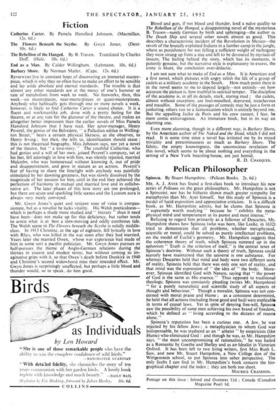Fiction
The Rebellion of the Hanged. By B. Traven. Translated by Charles Duff. (Hale. 10s. 6d.)
REVIEWERS live in constant hope of discovering an immortal master- piece, which is why they so often have to make an effort to be sensible and lay aside absolute and eternal standards. The trouble is that almost any other standards are at the mercy of one's humour or rate of metabolism from week to week. No fireworks, then, this week—no masterpieces, near-masterpieces or quasi-masterpieces. Anybody who habitually gets through one or more novels a week, however, is likely to find Catherine Carter a sound choice. It is a fluent and workmanlike job, done with a pretty feeling for the theatre, or at any rate for the glamour of the theatre, and makes an altogether better impression than the earlier novels of Miss Pamela Hansford Johnson that I have read. Her actor-manager, Henry Peverel, the genius of the Belvedere, " a Palladian edifice in Welling- ton Street," bears a certain physical likeness, as she observes, to Henry Irving ; but then, she tells us, identification should cease : this is not theatrical biography, Miss.Johnson says, nor yet a novel of the theatre, but " a love-story." The youthful Catherine, who had genius and a will of her own, joined Peverel's company, sat at his feet, fell adoringly in love with him, was silently rejected, married Malcolm, who was homosexual without knowing it, out of pride and disappointment, and grew in stature as an actress. Peverel's fear of having to share the limelight with anybody was painfully stimulated by her dawning greatness, but was slowly dissolved by the magnitude of her passion for him, until in the end they achieved the perfection of harmony in mutual and married love and in collabo- rative art. The later phases of this love story are too prolonged, but there are acute and sparkling little scenes and the Lyceum aura is always very nicely conveyed.
Mr. Gwyn Jones's quiet and reticent tone of voice is compas- sionate, but as a novelist he lacks vitality. His Welsh poeticalness- which is perhaps a shade more studied and " literary ".than it need have been—does not make up for this deficiency, but rather tends to arrest what is at best a slow-moving and oddly cumbrous tale. The Welsh scene in The Flowers beneath the Scythe is solidly middle- class. In 1913 Christine, at the age of eighteen, fell lyrically in love with Rhys, who was killed in the war soon after they had married. Years later she married Owen, whose war experience had made of him in some sort a pacifist politician. Mr. Gwyn Jones pursues or half-pursues the theme of Anglo-German relations during the thirties in sincere and modest terms, but without coming to im- aginative grips with it, so that Owen's death before Dunkirk in 1940 and Christine's second widowhood miss their intended effect. Mr. Gwyn Jones is surprisingly unaffected, but perhaps a little blood and thunder would, so to speak, do him good. Blood and guts, if not blood and thunder, lend a naive quality to The Rebellion of the Hanged, a disappointing novel of the mysterious B. Traven—surely German by birth and upbringing—the author oi The Death Ship and several other novels almost as good: This describes a characteristic incident of the Revolution in Mexico—the revolt of the brutally exploited Indians in a lumber camp in the jungle, where as punishment for not felling a sufficient weight of ntahogany they were strung up from a tree and left to be devoured by myriads of insects} The feeling behind the story, which has its moments, is patently genuine, but the narrative style is explanatory to excess, the irony is blunt, the conclusion over-didactic.
I am not sure what to make of End as a Man. It is American and a first novel, which pictures with angry relish the life of a group of cadets at a military academy in the South. How much point there is in the novel seems to me to depend largely—not entirely—on how accurate the picture is, how truthful in satirical temper. The discipline of the academy is, in all its details, stark, staring mad ; the cadets, almost without exception, are foul-mouthed, depraved, treacherous and maudlin. Some of the passages of comedy may be just a form of junketing, others run to a fantastication which is entirely beyond me. But the appalling JaCko de Paris and his crew cannot, I fear, be mere comic extravagance. An immature book, but in its way an alarming one.
Even more alarming, though in a different way, is Barbary Shore, by the American author of The Naked and the Dead, which I did not read. It is some time since a novel has irritated me by its mixed triviality and pretentiousness as much as Barbary Shore. The falsity, the empty knowingness, the unconscious revelation of this novel, which seems to be about nothing and everything in the setting of a New York boarding-house, are just horrid.
R. D. CHARQUES.


































 Previous page
Previous page